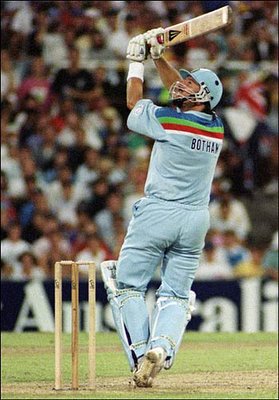So long Beefy
 Former England captain David Gower farewells his old sparring-partner Ian Botham. This article appeared at the time of Botham's retirement in the summer of 1993
Former England captain David Gower farewells his old sparring-partner Ian Botham. This article appeared at the time of Botham's retirement in the summer of 1993The night of Saturday July 18, 1981 was one of the great pre-rest-day parties. Modern economics and the desire to offer Test cricket to the paying public on a Sunday mean that such opportunities to unwind in the middle of a Test are a thing of the past, consigned to the dustbin of history, unless of course the competition from the Wimbledon men's final or some similar event is just too great. England on this occasion were not in a great position, having followed on against Australia on a pitch that had already shown itself to be most unpredictable.
The obvious course of action was not to mope about the predicament, but just in case anyone was thinking of doing so, Ian Botham had already issued a mass invitation to a barbecue extraordinaire at his place in Epworth, a mere 40-minute drive from Headingley on a good run, or, shall we say, with 'Both' at the wheel.
Although a genuine Mass might have been more appropriate, there was very little religion involved that night, even if I am sure some could quite easily have moved straight on to matins the following morning, and the various kegs of real ale avail-able were treated with a certain reverence throughout proceedings. This was, of course, the prelude to a sequence of events that meant that the series against Australia that summer will always be known as 'Botham's Ashes'. His 149 not out on Monday, and some lethal ton to snatch another win, and another, technically better, hundred at Old Trafford to clinch the series.
I have also been privileged to watch many of Ian's other matchwinning performances either from the dressing-room, my spot in the field, or even from the other end at the crease, an ideal viewing position, if sometimes dangerous when the Botham blade came down at its straightest. Can I offer his singlehanded demolition of India in the Jubilee Test early in 1980, and his 138 at Brisbane in the opening Test of the 1986-87 series, as a couple of prime highlights?
But what of the man behind these feats? He is no ordinary fellow, for sure, capable of the odd error of judgment to remind us that he is, after all, mere flesh and blood like the rest of us. The Press have made much of the two sides of Ian over the years, even at times inventing misdemeanours to add to those proven and well-publicised indiscretions that at one stage nearly cost him his career. Ian is a genuine allrounder, forgetting for now any cracks about the figure that has admittedly grown more rotund over the years -- just look at the videos of the sylph that began its Test career against Australia in 1977!
His interests include most sports: he punishes a golf ball mercilessly, has hit a baseball out of the Dodgers' stadium in Los Angeles, does not mind a wager on a horse or 12, and will outplay any of Bill Beaumont's former colleagues after hours. He has learnt to appreciate some of the liquid that can pass through his gullet at an alarming (at least to someone like myself of vastly inferior capacity) rate. His wine collection, some of it cellared at the current Botham home in North Yorkshire, shows eclectic taste, mingling top clarets and burgundies with some of the best that the new-world winemakers of Australia and South Africa can produce. If he runs short he has a nasty tendency to re-order by the container-load.
The man is generous to a fault, good company (if hard to control), and there are many aspects of the man that time and space preclude a mention of here. The word for me that sums him up best is 'bravado', defined by my dictionary as an 'ostentatious display of courage or boldness'. Need I say more: once again it is what English cricket is crying out for.
So long, Beefy. And thanks for all the fish.
After Botham announced his retirement Financial Times put this business of cricket into some sort of perspective. It ignored glorious yesterday with the simple report: 'Durham county player Ian Botham retires today from first-class cricket, two months earlier than expected, at the end of his team's match against the Australians.' Durham county player? It's one way of describing the greatest of his time.


0 Comments:
Post a Comment
Subscribe to Post Comments [Atom]
<< Home